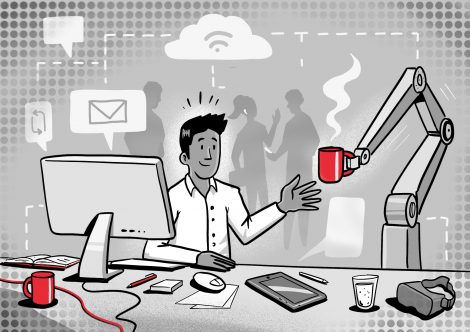When people (do not) see digital transformation as an opportunity

Threat or opportunity? The attitude of employees towards digital transformation often determines the success of the change. But what influences people’s perception of digital change?
Digital transformation is a high-priority topic for most companies in Germany. Digital business models and customer experiences, virtual collaboration, process automation, networked production – the affected areas are numerous, the challenge enormous. And the Corona crisis has given another boost to digitization (see Bertelsmann Stiftung, Münchner Kreis, 2020).
The fact that companies are making very different progress in their digital transformation is partly due to their employees and their attitude toward digitization. Depending on whether they see digitization as a threat or an opportunity, they either oppose or support the comprehensive changes. But the question is, what factors influence the employees’ perspective?
Differences between office and factory workers
How people experience digital transformation is one of the central questions that was recently examined in a study by the Bavarian Research Institute for Digital Transformation (bidt). The researchers conducted 35 in-depth interviews with women and men in different social situations and positions. With regard to digitization, the focus was on, among other things, the flexibilization and automation of work.
With regard to automation, for example, significant differences were found between office and factory employees. While the perception and evaluation of automation approaches in the office was predominantly experienced negatively as a compression of work and an increase in stress, a clearly positive picture prevailed among those respondents who experienced automation in the area of traditional manual work, which is primarily characterized by a reduction in physical stress in the sense of a humanization of work.
The authors write that the experienced influence on one’s own working conditions determines whether people experience automation positively or negatively (Thomas Lühr et al, 2020).
The crucial factor is the design of flexibilization of work
This also applies to the flexibilization of workplace and working time. According to the authors, the decisive factor is whether the new opportunities associated with this can be perceived by the respondents as an opportunity to improve working conditions, for example with regard to the work-life balance, or whether they are experienced more as a threat, for example in the sense of a further compression and intensification of work with corresponding consequences for individual stress (Thomas Lühr et al, 2020).
It is interesting to note that the perception of digitization does not depend primarily on personal dispositions, but on objective factors. What is decisive is how the automation or flexibilization of work is designed in the respective company context and what the individual power of action of employees is in the light of their objective position on the internal or external labor market. If one’s own workplace is seen as rather insecure, then digitization is also seen as a threat, but it is not the technology itself that is rejected.
The authors conclude that the challenge for organizations as a whole is to influence the conditions of digital transformation in such a way that experiences of contradiction are reduced and more and more people are able to experience the possibilities of digital transformation as a “productive force” for expanding their personal capacity to act (Thomas Lühr et al, 2020).
Empowering employees
However, whether employees develop a positive attitude towards a change initiative also depends on whether they see the change as meaningful and appropriate. The necessity for economic success must be clear to people (see Tammo Straatmann et al, 2016).
Another decisive factor is how others, i.e. colleagues and above all managers, behave: The more people around me expect me to support change, the more likely I am to change my behavior (Tammo Straatmann et al, 2016).
The employees’ ability to see digitization as an extension of their ability to act has a lot to do with their own perceived control: How easy or difficult will the new work become for them? In other words, the sooner employees feel that they have the necessary resources and skills, the more likely they are to develop a positive attitude to the change and will support it (Tammo Straatmann et al, 2016).
For companies, this can mean, for example, taking a closer look at the concept of “empowerment” as part of the digital transformation. Psychological empowerment is the experience of importance, competence, self-determination and influence at work. People who feel psychologically empowered experience their work as meaningful and dare to take on their work tasks. They perceive autonomy and are convinced that their work can make a difference (Carsten Schermuly, 2016).
When it comes to change, companies must therefore take early action to ensure that employees become active participants in the change process and feel like such – this is all the more important in the context of the digital transformation.
Sources:

